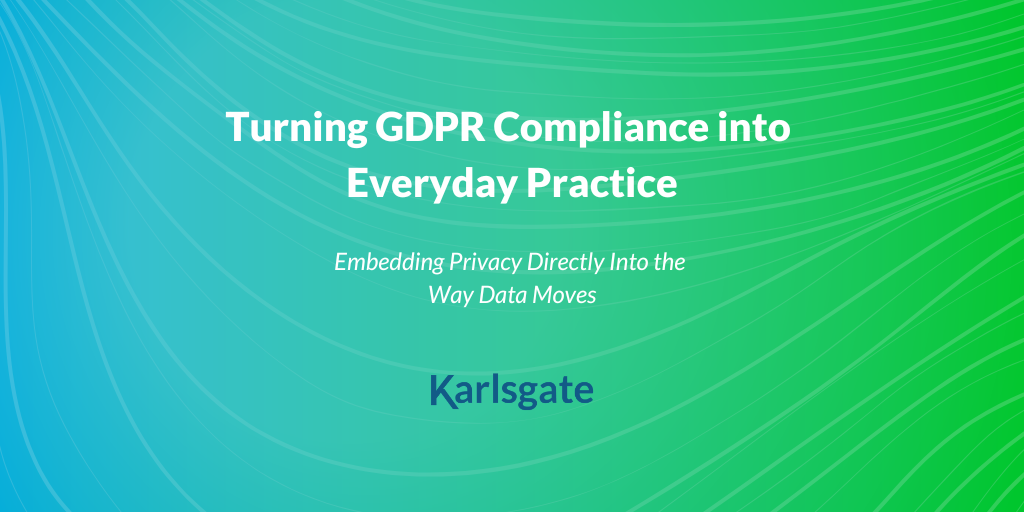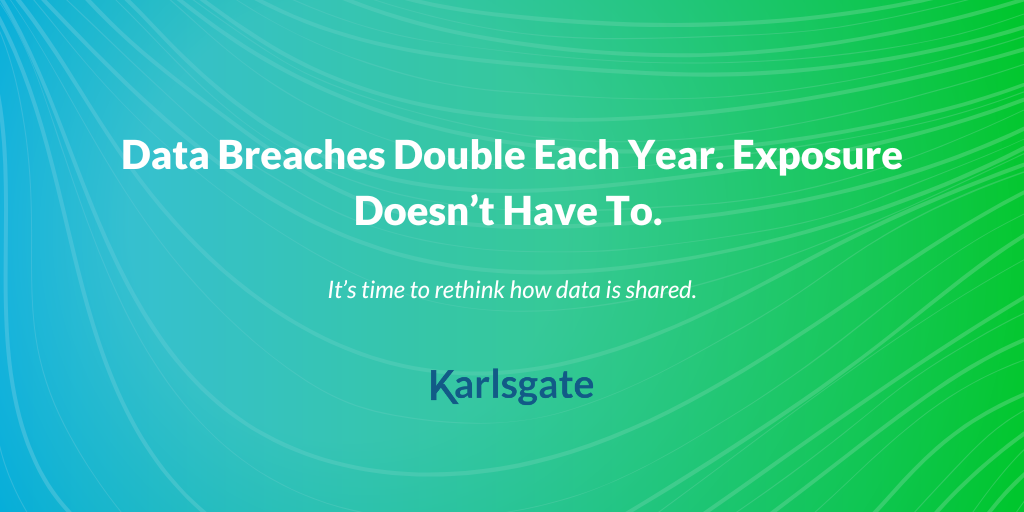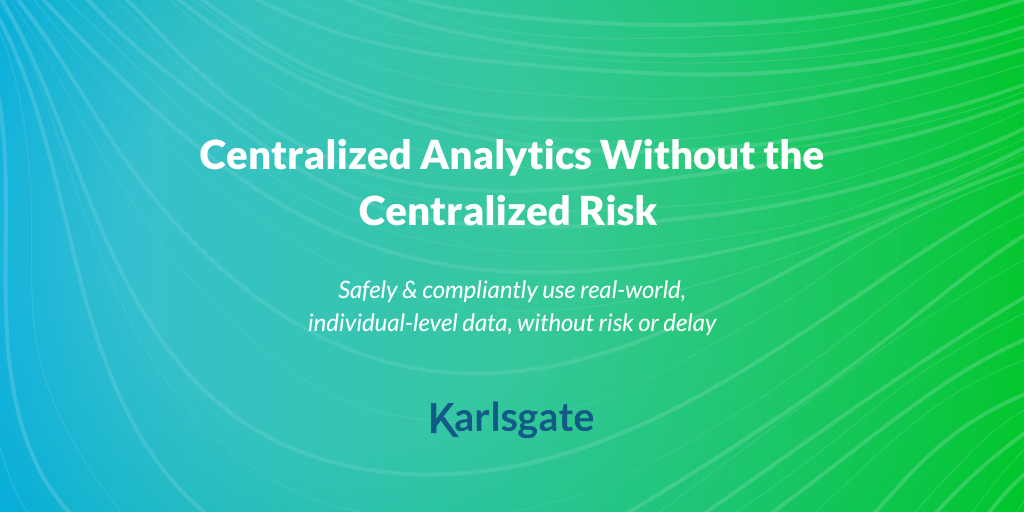Protected Data Workflows for AI
Karlsgate isn’t a point solution. It’s the privacy-first layer that makes sensitive data usable across teams, partners, and models.
Designed for sensitive data.
Proven at scale.
Chosen by the teams shaping the future of AI.

AI Is Only as Smart as the Data It Can Safely Use
AI pipelines often skip the data that matters most because it’s considered too risky to touch.
Karlsgate changes that by enabling protected data workflows that connect sensitive data to AI without exposure, custody, or complexity.
Responsible AI requires that no identified data ends up in the model training set. As a result, most breakthroughs have come from anonymized, aggregated, or publicly available data. That won’t be enough to sustain continued progress.
Users are already noticing that it feels like every model is starting to sound the same. That’s what happens when everyone draws from the same generalized data sets.
The next leap forward depends on something richer: a more complete view of individual behavior, drawn from real-world signals over time.
Correlations between behavior and outcomes are where smarter models begin. But unlocking those insights requires more than consent and governance. It requires specialized tools that restore protective barriers around individual-level data and make it safe to use without sharing or exposure.
The next wave of AI progress will be built on high-quality, real-world, individual-level data. This is the kind of data that drives precision, relevance, and real intelligence. But it is also proprietary, sensitive, and heavily regulated.
Karlsgate makes it usable, and it is not hypothetical. These protected workflows are already live inside global organizations, enabling safe, scalable AI innovation across teams and regions.
The Karlsgate Identity Exchange (KIE) powers these workflows by preserving privacy, automating compliance, and giving your team safe, direct access to the data your models actually need.
Not just for one job or one model, but for every collaboration, across every team, as a foundational part of your infrastructure.
Link Diverse Datasets Without Sharing Identity
AI models improve dramatically when trained on data that captures the full picture.
But most high-value datasets remain siloed, separated by departments, systems, or organizations. Connecting them typically means exposing identity, centralizing sensitive data, or handing access to a third party.
Karlsgate removes that risk.
With the Karlsgate Identity Exchange (KIE), organizations can privately link individual-level records across distributed environments using one-time match keys generated locally on each side. There are no shared IDs, token registries, or exposed identifiers. The result is a joined dataset that behaves like it came from a single source, without ever compromising privacy or control.
Example Use Cases
Healthcare: A life sciences company links EHR data with insurance claims and lab results to model disease progression. No PHI is exchanged, yet patient-level continuity is preserved.
Retail: A brand connects loyalty data across banners to create a unified customer training set, without moving or centralizing identity data.
How are datasets linked without exposing identifiers?
Each party uses the KIE Node to generate a one-time match key. These are computed independently but result in the same value, allowing matches without raw PII. Identifiers are never shared or exposed. Matching occurs within a triple-blind, streaming protocol without revealing any source data. Even Karlsgate never gains access to your data at any point in the workflow. Zero-trust methodology means never needing to depend on anyone else to protect your data.
What if my data partners use different formats or identifiers?
The KIE Node is built to handle real-world variability. Our platform automatically detects formats, recognizes field semantics, and standardizes data. It identifies available match keys, flags mismatches, and recommends a matching cascade. As long there is at least one overlapping identifier, KIE will detect common match keys and guide users through building a secure matching cascade.
Is this approach compliant with privacy regulations?
Yes. Karlsgate’s data linkage method complies with HIPAA, GDPR, and other global standards by ensuring identifiers are never exposed, persisted, or reused.
Push Anonymized Data into AI Pipelines with Built-In Controls
Preparing data for AI should not require giving up control. Yet anonymization is often manual, inconsistent, or applied after data has already left the organization. That creates delays, compliance risk, and governance gaps.
Karlsgate changes that by integrating anonymization and protection directly into your data workflows. The Karlsgate Identity Exchange (KIE) allows you to transform and deliver only the data needed for AI, stripped of risk before it leaves your environment.
For added protection, Downstream Data Flow Protection (DDFP) ensures that the outputs can only be used by the intended recipient or process, protecting data beyond the point of delivery.
Example Use Cases
Retail: A retailer trains an LLM on purchase sequences without exposing sensitive transaction logs, using selective anonymization and DDFP.
Insurance: A carrier builds a fraud detection model using claims records linked remotely, stripped of identifiers, and streamed securely from multiple source systems
What is Downstream Data Flow Protection (DDFP)?
DDFP encrypts workflow outputs so they can only be decrypted and used by the intended system, model, or workflow step.
Can I control which fields are included in the anonymized dataset?
Yes. The KIE Node allows fine-grained control over which attributes are included and how they are transformed.
Does this integrate with my existing AI or ML tools?
Yes. Protected datasets can be delivered into any model or system using standard formats and encrypted handoff protocols.
Stream Protected Records into AI Workflows Using Model Context Protocols (MCPs)
AI models are getting more powerful, but using external data in those models still creates friction. Connecting sensitive datasets to an AI workflow often means custom pipelines, risky exports, and unclear policies around data use.
The Model Context Protocol (MCP), introduced by Anthropic and backed by OpenAI, Google, and others, changes that. MCP offers an open standard for feeding AI systems structured inputs with permissioning, traceability, and context baked in.
Karlsgate fits seamlessly into this new ecosystem. With the KIE Node, you can wrap protected, anonymized records in an MCP-compatible format and stream them directly into AI tools without exposing source data or writing custom connectors. Your data stays safe, your workflow stays automated, and your models get the inputs they need.
Example Use Cases
AI Vendor: A healthcare AI provider receives anonymized patient-level data from hospital partners through Karlsgate. The KIE Node packages each record in MCP format and streams it into the model for training. No PHI shared. No custody risk.
Retail AI Team: A brand enrichment engine pulls customer insights from partner data providers. Each provider uses Karlsgate to push protected records into the workflow, wrapped with policy metadata and usage permissions via MCP.
What is MCP and how does Karlsgate use it?
MCP is a standardized way to deliver structured data into AI systems. Karlsgate uses it as a delivery mechanism, wrapping protected records in an MCP-compatible format for secure, automated streaming into models or downstream apps.
Do I need to change my model to accept MCP input?
Not necessarily. Karlsgate supports flexible formatting to align with your model’s expected input structure. The MCP wrapping is lightweight and adapter-friendly.
Can I include usage policies or lineage metadata with each record?
Karlsgate supports structured, protected data delivery that aligns with MCP formatting. Depending on your workflow, additional metadata may be included to support traceability and model input requirements. (Ask us about specific configurations.)
Why It Matters
AI doesn’t just need more data.
It needs meaningful data; protected, precise, and ready to move.
Karlsgate is more than a security layer.
It’s the engine behind protected data workflows. It automates what used to be manual and unlocks what used to be off limits.
Individual-level insight without exposure
Cross-source linkage without centralization
Streamlined delivery into AI workflows without delay
The next generation of AI winners won’t just have the best models. They’ll have the best data and the infrastructure to use it without compromise.
This is how sensitive data moves. Safely. Efficiently. At scale.

Turning GDPR Compliance into Everyday Practice
Embedding Privacy Directly into the Way Data Moves

Data Breaches Double Each Year. Exposure Doesn’t Have To.
It’s time to rethink how data is shared.

Centralized Analytics Without the Centralized Risk
Safely & compliantly use real-world, individual-level data, without risk or delay
FAQs
Frequently Asked Questions
How long does it take to process a trade?
It depends on the size of the files and the number of match passes and attributes appended. In general, 1 million records can be processed in 11 seconds (simple match pass) whilst 100 million records with 10 match passes and 600+ attributes appended would be processed in less than 18 hours.
Does Karlsgate do fuzzy matching?
We define fuzzy matching as loose matching rules based on probabilities. Our matching is fully deterministic—you will always have clarity over a match versus a non-match. To ensure that all potential matches are found, our software performs “soft matching,” or matching on equivalent alternatives, for examples “1 MAIN ST. APT. 2” = “1 Main Street #2”. Soft matching does not need direct access to PII to work and automatically rectifies differences in standardization, whitespace, punctuation, abbreviations, and phonetically similar words.
How does Karlsgate optimize matching to ensure high-quality match rates?
While the ultimate matching is deterministic due to the nature of the cryptoidentities being matched, Karlsgate’s node software performs robust data normalization and standardization processes to align identifying data elements prior to creating the cryptoidentities, which boosts match rates without over-matching.
How many match passes can I use?
For a single trade, you can have up to 10 different match passes, cascading down.
Is the protection resistant to both classical and quantum computing attacks?
Yes, FIPS-compliant cryptographic algorithms are available for each exchange that range from traditional Elliptic-curve Diffie–Hellman key exchange (e.g., X25519) to post-quantum cryptography Module-lattice key encapsulation (e.g., ML-KEM-1024).

